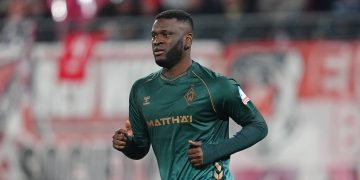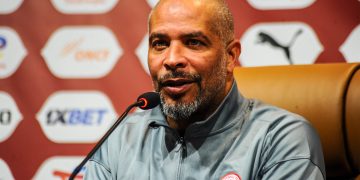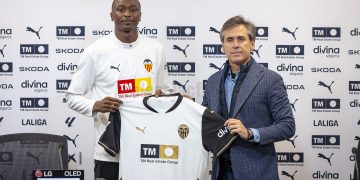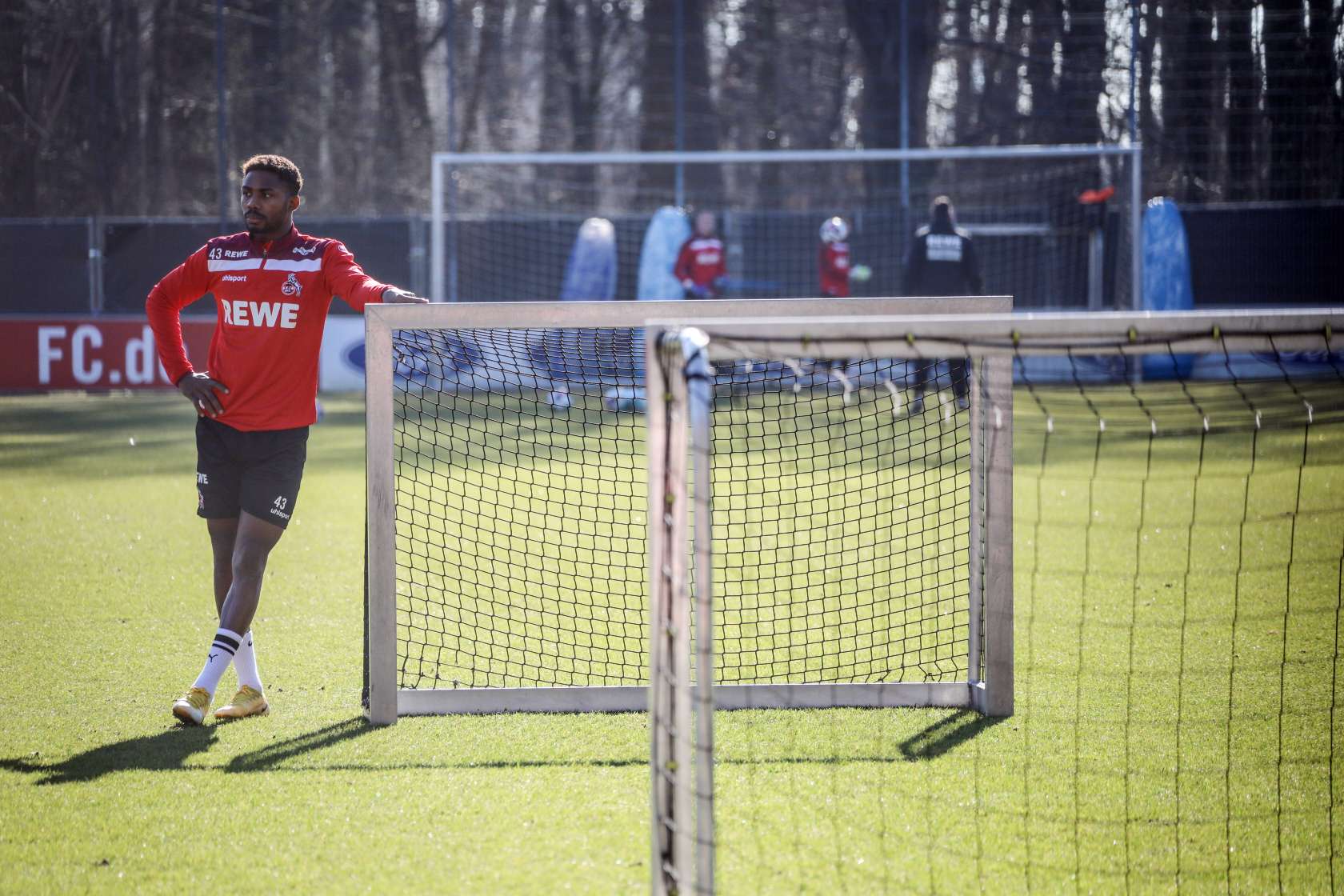The rains did not dampen the atmosphere inside the Dacia Arena on Saturday afternoon when Udinese marched out to their final game of the year against Cagliari in Italy’s Serie A. As the grande bandiera of the home team was unfurled in the stands a few metres away, one could not but share in the excitement of the teeming fans who came to see their club attempt to end the year with a positive result. My main focus was William Troost-Ekong, the vice-captain of Nigeria’s Super Eagles and man in the middle of a defensive trio for Luca Gotti’s game plan.
Ekong moved to Udine, the storied Friulian city in the north of Italy, in 2018 after one full season in Turkey. Here he has become an important part of the defence and was offered an extension to his contract at the beginning of his second year. An early clearance after Cagliari’s Belgian midfielder Radja Naingollan hit the woodwork signified that William was going to have to be very alert during the game. Udinese went on to win 2-1, with goals from Rodrigo de Paul and Guinean Sekou Fofana on either side of Joao Pedro’s equalizer.
When we sat down after the game inside a lounge, William was full of verve and happy to end the year with three points that helped to push Udinese up to 14th spot on the standings. It was a year where he won a bronze medal at his first Africa Cup of Nations. He has also grown in stature in the team where he became vice-captain, less than five years after his first call up under Stephen Keshi.
During the AFCON, William became the face of the fight against Neglected Tropical Diseases (NTDs) after he teamed up with New York-based the END Fund through his collaboration with Common Goal, the global football-for-good organization. The 26-year-old used his voice to draw attention to the impact of NTDs that affect more than 120 million Nigerians and the availability of free medication across the country.
On and off the field, William has been busy. So it was a good opportunity for Soccernet.ng to sit down with him to x-ray his year in this interview conducted by Lolade Adewuyi:
Soccernet: It has been almost two years since you moved to Italy, how's life in Italy and Serie A? What’s been your experience so far?
William Troost Ekong: It has been a good experience so far. I had little time to adapt because I arrived quite late in August (2018) and ever since then it has been a lot of positives. Udinese is trying to improve like always, we have a lot of young players and foreign players and I am very happy to be a part of it. Since I’ve been here, I have only missed a handful of games and I feel like I’m improving a lot. I really love living in Italy with my family.
You recently signed a new deal with Udinese to stay until 2023 – what convinced you to commit your long-term future to the club?
I believe in the project. It is a two-way thing – the club has given me a lot of confidence and since I’ve been here I have played a lot, I have improved a lot. I’m enjoying my time here and it was a way for the club to show they appreciate me.
View this post on Instagram
Udinese have struggled in the Serie A this season whereas last season you finished in 12th spot. Your victory against Cagliari moved you up to 14th and you have now ended the year on a positive note. What do you think the club needs to do to stop struggling and move into the top half of the league?
It is difficult to say where we are going to finish at the end of the season, we need some more consistency. Since I’ve been here we’ve had four managers in my year and a half. It has been different philosophies and a lot of changes. Now the team is starting to stabilize and many of the players from last season stayed here so we’ve managed to get to know each other better. Our coach now, Mr [Luca] Gotti, is very good for the team and we can hopefully climb the table because we have a lot of quality. But we just need the right foundations for everyone to shine.
Serie A has been plagued with a lot of racism issues that have come to the fore this year. The League recently unveiled some graphics that are supposed to fight racism that didn’t sit well with many people across the modern world, have you experienced racism in Italy and what do you think about these attempts to fight racism?
I haven’t experienced racism since I’ve come here but of course, you read about it. We’ve seen it in some games with different players. There’s no place for racism in football. For me, as a player of a multicultural background raised in different countries, I have seen many different things. Football is now a globalized sport, there’s no room for racism and what we see in the Serie A is unacceptable
Moving away from club football to the National Team – this year has been an interesting one for you. You won a Bronze medal at the AFCON and put in a couple of ‘man-of-the-match' performances at the tournament. How would you describe your growth into a senior player in the squad over the last 12 months?
This year has been different. I think after the World Cup when all of us had that experience of playing at a major tournament for the first time, there were a few of us that played before, but not a lot. When we came to the AFCON we felt more prepared and we did well to qualify the way that we did. Also during the tournament, we had some small setbacks and difficult situations including the game against Cameroon where we had to fight back to win the game. Even against South Africa, to score so late and to pass the quarter-final, I think our team showed great resilience. So I think this year has been a year of more responsibility. I’ve also become one of the older players in the team compared to before because our team is so young and we’ve seen some of the older players now retire. I have a different role in the team and I am really enjoying playing for the Super Eagles. I think we have a great vibe in the team and there’s a real feeling of unity. And to see that we have so many exciting talents in the team is very good for the future of Nigerian football and I’m hoping to be a part of that for a little bit longer and hopefully, we can win a trophy during my time. That has been my goal. This year has left me hungry for more so it is promising to see which direction the team is going.
You have also become the Vice-Captain of the team and led them in top games since the end of the AFCON in the absence of Ahmed Musa. You came into the team in 2015 under Stephen Keshi and have since played under four coaches. Can you tell me about this transformation and your journey?
I think it’s been something that happened over time. I was just trying to focus on my game qualification by qualification, now we’ve found ourselves five years down the line by next summer. I’ve been privileged to play about 40 games for Nigeria which is more than I would have dreamt of as a kid. Along the road, you grow in your responsibility within the team and I didn’t expect anything. It’s an honour to wear the captain’s band for Nigeria when I do it. However, we still have Ahmed Musa who is a very decorated player and a fantastic player in our team. Who knows what the future holds? I hope Musa plays with us for a long time. But I’m just happy to be a part of the team if I wear the band or not, it doesn’t really matter. As one of the older players – we have four or five players like Kenneth Omeruo, Musa, [Wilfred] Ndidi who I think is also growing into one of the leading roles in the team – we all need to step up to take this team to another level.

Let me take you back to the game against South Africa at the AFCON, tell me how your winning goal happened and your celebration.
South Africa is a team we respect, they are a good team in Africa and they always play good football. But we’ve managed to get good results against them now. The only game we slipped up was the game at home in 2017 when we played the AFCON qualifiers in the first game but we ended up still winning the group. It is great to see that when we have setbacks that we have resilience. In the same way in the quarterfinal when they equalized, a little bit fortunate, we managed to hang in and we were pressed to find another goal. Of course, you hope to score every corner that you go forward and I happened to be in the right place at the right time. The ball came to my corner and I could score. It was a moment of joy and ecstasy when you score and we were able to qualify. I was just happy to win that game.
Back home there has been a contentious argument about the increasing reliance on players born and bred abroad in the Super Eagles – seeing that you have come through that route, how would you advise the NFF to proceed?
As a country, we have to consider all players with Nigerian roots. I’m grateful for that otherwise I won’t be playing for Nigeria if you only considered the home-based players. It’s also part of modern-day football. I was born abroad but my father is Nigerian so I’m first-generation Nigerian born abroad. For many players like that, it is important to make sure when you choose the team for continuous development in the long-term, to pick the best players available. However, I strongly believe there has to be increased investment in the NPFL because you can’t force anyone to be selected but the home league needs to be consistent. I think it is good when we do see a home-based player come with us and they’re really part of the team. For the long-term, the best thing will be to have a great platform for players in Nigeria to show themselves there and hopefully get selected. We can’t disregard foreign-born players either, I think it will be a disadvantage for Nigeria. We have to look across the board and hopefully, there will be a good balance [that] will hopefully see Nigeria grow.
Which young Nigerian players are you excited about for the future?
We have so many young players, most of the players are under 24. Wilfred Ndidi is someone that is already doing so well and I think he’s going to be a big name, hopefully, a household name within Africa. Maybe he could win an African Player of the Year because he’s at such a stage now. Of course, we have [Samuel] Chukwueze, we have Victor Osimhen, Ola Aina is also a good young player. It is good to see them all coming and it puts pressure on us older players, everyone has to stay on top of their game. And for the coach, it is becoming easier to put together a good team because if there’s a player that’s not performing or is injured, we have so many options that entail our team shouldn’t get any weaker.
Former Dutch national team player, Rafael van der Vaart, was quoted to have said if you had been patient, you could have become a part of the Oranje, the Dutch national team. Do you look back to think he’s right and are you satisfied with what you have achieved with Nigeria so far?
I’m satisfied, I’m really happy with the place I am right now. Of course, when you do look back it is always easy to advise someone what they should have done. But I think I made a lot of right decisions and I stand by my decisions that it was always a dream to play for Nigeria. The pride I get playing for Nigeria wearing the shirt, I wouldn’t want to trade that for anyone else. Who is to say that playing for the Netherlands is better than playing for Nigeria? I respect his opinion and his view because it’s also showing that I’m doing something well for people to be talking like that and especially a great player like Rafael van der Vaart. I’m very happy about my decision and wouldn’t change it for anything.

You have a public service health campaign running in Nigeria at the moment. Tell us about the campaign and how you came to be a part of it.
The fight against Neglected Tropical Diseases (NTDs) is a great campaign because it affects millions of people in West Africa and Nigeria. To be on TV in Nigeria now is probably the best way of spreading the word. It has been on radio and TV stations and been translated into different languages. The whole idea is to raise awareness because the treatment is free but people just have to know about the possibility of getting the treatment and hopefully, it can prevent a lot of people from getting sick.
How did you first hear about NTDs?
When I started working with Common Goal, we went through the different projects that I could be a part of. When they told me about NTDs, it wasn’t something that I was aware of myself. Of course, it comprises of different sorts of diseases. For me, what was astonishing is the fact that the END Fund was already doing work and that the treatment is free for people and they just need to be aware of the situation. It seemed like a perfect initiative to start my Common Goal journey with.
How is it important for footballers to speak out against issues like the NTDs?
So it is obviously something that I am now doing publically because the idea is to raise awareness for it. I see quite a lot of footballers who are doing their own charity work which is not always in the public eye. It was also not my goal to raise awareness for me, but this particular campaign needs the attention and that’s why I think it is good to try and talk about it as much as you can
What is something about NTDs that you didn't know before, but now know, that you think it important to share with the general public?
I didn’t know that there were so many diseases that were preventable and curable by, sometimes, only one form of medication. I am sure a lot of other people didn’t know that either. I think it is a great lesson to learn as well as the availability of these medicines for everyone.
You and your Super Eagle teammates are truly a force for good – have you spoken to them about Common Goal and/or NTDs?
Of course, when we spend time together we talk about so many different topics and people see what I am involved with on social media as we all follow each other a lot of the time. Everyone is aware of the campaign and I was glad to see Leon Balogun join as well and hopefully more players will get involved with Common Goal and from there on, everyone can choose different projects to be a part of. I think the main thing is awareness, and somehow just by re-tweeting and also supporting a campaign, that can already have a lot of impact on other peoples’ lives. But I also see a lot of charity work that is not necessarily publicized. I think there is a great awareness in the form of the responsibility within the team now for us that are sort of privileged to try and give back to our communities and Nigeria because we’re a country that could improve a lot. So it is fantastic to see that the guys are involved in different projects.
How do we get more footballers to follow in your footsteps and support NTDs – diseases that affect the poorest of the poor and prevent communities from leading healthy and prosperous lives?
I think that the main thing is spreading the word. The football world is quite a small bubble when you really get into it. Often, you might have played against different players, you meet a lot of players when you change teams and if you’re privileged enough to play for the national team you normally play with players who have quite a following or a voice within their countries. The main thing is by talking about it openly and also for other players to know that whatever you decide to donate might not seem like much for one person relatively, but it can help so many more people.
Would you be interested in going with the END Fund to Nigeria to see how these diseases affect communities?
That is another great way of doing the work. Unfortunately, I’m quite strapped for time because I have my responsibilities here in Italy and when I do have some free time, I always seem to be with the national team in camp. I have limited windows of opportunity but I think during the summer break I might have a little bit more time and an opportunity to get involved and also visit some of these sites and hopefully speak to some people and interact and see how I can help.





